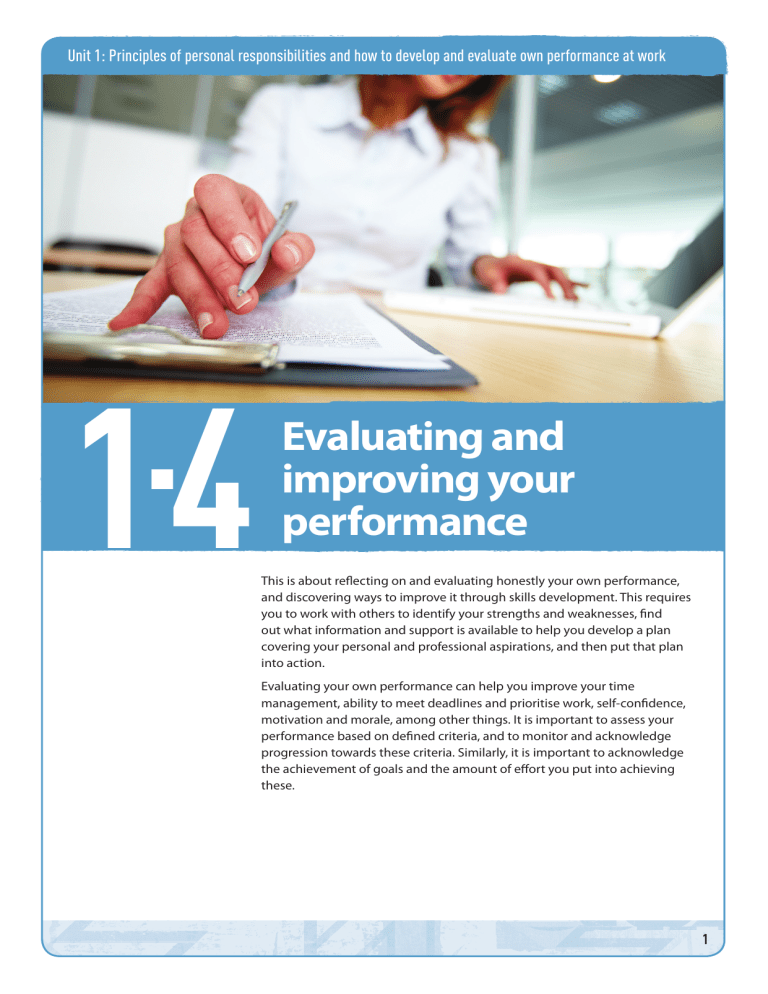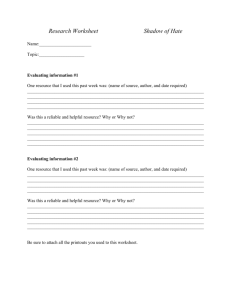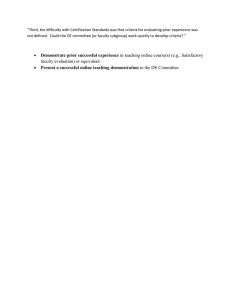Topic guide 1.4: Evaluating and improving your performance

Unit 1: Principles of personal responsibilities and how to develop and evaluate own performance at work
1
.
4
Evaluating and improving your performance
This is about reflecting on and evaluating honestly your own performance, and discovering ways to improve it through skills development. This requires you to work with others to identify your strengths and weaknesses, find out what information and support is available to help you develop a plan covering your personal and professional aspirations, and then put that plan into action.
Evaluating your own performance can help you improve your time management, ability to meet deadlines and prioritise work, self-confidence, motivation and morale, among other things. It is important to assess your performance based on defined criteria, and to monitor and acknowledge progression towards these criteria. Similarly, it is important to acknowledge the achievement of goals and the amount of effort you put into achieving these.
1
Unit 1: Principles of personal responsibilities and how to develop and evaluate own performance at work
Link
You will find out more about evaluating and improving your own performance in Unit 11: Plan and manage your own workload; please refer to this unit in addition to the material covered here.
1 Ways of evaluating and improving
Self-evaluation
You need to make regular assessments of the way you work and the progress you are making. Ask yourself whether you are managing your work efficiently, whether you achieve the deadlines you or others set you and whether you are taking advantage of opportunities to increase your self-confidence and learn from new experiences. As part of your assessment you should identify areas for improvement and skills you may need to learn. Having identified these, set yourself targets within a sensible timescale to achieve them.
Feedback
Feedback is an essential part of evaluating your performance. Colleagues, contractors and clients will be able to identify what you have done well, but they will also be able to objectively identify areas for improvement.
Feedback helps you to identify areas for improvement (such as skills to develop, the level of customer service you provide clients, your planning and coordination skills, etc.). It also helps you become more aware of your own practice and identify problems before they arise and things you should do differently in the future.
You play a part in encouraging feedback. You should be open to feedback and encourage an honest appraisal. You should also ask for specific examples so that you fully understand any issues that are raised. Feedback can be gathered from colleagues and your line manager in individual meetings and group discussions, in a formal or informal manner.
Some of the ways you can use feedback are listed below.
• Monitor your performance regularly to make sure that it is as effective as possible.
• Regularly describe and analyse any improvements that need to be made, either by you or through involving others.
• Maintain a level of knowledge and understanding that enables you to carry out your role effectively.
• Change the way you work in line with any relevant or new approaches or recommendations.
• Identify any skills gaps.
• Develop a personal development plan and update it regularly to include new aims or achievements.
1.4: Evaluating and improving your performance 2
Unit 1: Principles of personal responsibilities and how to develop and evaluate own performance at work
Key term
360° feedback – feedback from your colleagues and managers.
2 Development plans
A development plan will often be part of your employer’s appraisal system. This will help you track achievements, areas for improvement, long-term objectives and training plans.
In order to be effective, you must consider the following.
• Success criteria must be realistic – if they are not, you are just setting yourself up for failure.
• You should identify reasonable goals.
• Your action plans should be accessible – consider the resources you have available to you in the workplace.
• Your development plan should take into account 360° feedback so you understand how your competencies are perceived by your colleagues.
Checklist
Use the following tips to get the best out of feedback from colleagues, contractors and clients.
Try to:
seek feedback on a regular basis, especially after you have identified development goals. Exchanging information and perceptions is a process, not a single event
receive feedback as a gift that provides you with honest information about your perceived behaviour/performance. Be open to what you will hear
let the person finish what he or she is saying
try to paraphrase (express in different words) what you are being told, either back to the person or in your own mind
ask clarifying questions
ask for specifics, if not provided
ask the person to give you alternatives to your behaviour
monitor your non-verbal and emotional responses
thank the person for being helpful to you
take the time after the feedback interaction to evaluate the information and consider specific actions for improvements.
Teach yourself to recognise situations in which certain behaviour needs to be altered. Feedback can help you self-monitor your behaviour at times when you are not at your most effective.
Use feedback to clarify goals, track progress toward those goals and improve the effectiveness of your behaviours over a period of time.
But do not:
take it personally
become defensive or explain your behaviour. You can either spend your time mobilising your defences or you can spend your time listening. Defending your actions is counterproductive, where listening is extremely useful
interrupt the other person
be afraid to allow pauses and periods of silence when you receive feedback. This gives you time to understand what is being said and it gives the other person time to think about what they say
ask the person to defend his or her opinion (there is a difference between ‘defending’ and ‘explaining’). Feedback is purely subjective perceptions of information. You can place your own value on it later.
1.4: Evaluating and improving your performance 3
Unit 1: Principles of personal responsibilities and how to develop and evaluate own performance at work
3 Careers in PR
It is important to establish what your expectations of PR are. Despite glamorous media representations of the industry, PR can involve a lot of hard work and long hours. That is not to say there are not perks to the job! Essentially, PR can offer an incredibly varied and challenging career, encompassing many different activities. As with many jobs, you will only find out if you are suited to PR through experience in the field.
Typical career path
Career development opportunities within the PR industry are excellent
(depending of course on the individual) but competition for jobs is fierce; PR ranks as one of the top three most popular career choices for young people in the UK.
There are a number of career entry points for people working in PR. The Higher
Apprenticeship in Public Relations provides you with formal training, real-world experience, a wage and an industry-recognised qualification on completion.
However, people may also enter PR through work placements, internships, volunteering, or through initially temporary positions to cover for maternity or illness.
There is no standard promotion pattern for the industry, but on successful completion of an initial training programme, the talented and industrious apprentice might expect the following career development plan:
• one to two years as a junior account executive
• two or three years as an account executive
• two to three years as a senior account executive or account manager
• moving to associate or account director.
Career opportunities in PR
There are a number of different fields into which PR apprentices can go. Every industry needs communications support so there is a whole array of sectors to work in. There are also many different areas within PR itself, from media relations to internal communications or crisis management.
People tend to enter at PR exec level. This is the more junior level where you get to grips with the core skills that you will need in order to progress to become an efficient and effective PR practitioner.
PR touches on a broad range of sectors, from charities and entertainment and media organisations to the business-to-business sector, politics and finance.
PR is as relevant in the private sector as it is in the public sector. There is a range of roles within PR, which includes:
• events, which involves the planning and coordinating of events such as launches or conferences
• communications, which involves copywriting for both internal and external audiences, online and offline, and creating press releases
1.4: Evaluating and improving your performance 4
Unit 1: Principles of personal responsibilities and how to develop and evaluate own performance at work
Link
You will find out more about careers and career planning within PR in
Unit 14: Career development.
Credits
Produced by Pearson on behalf of the
Skills Funding Agency.
The publisher would like to thank the following for their kind permission to reproduce images: Dmitriy
Shironosov/Shutterstock.com,
Goodluz/Shutterstock.com.
• media relations, which involves dealing with journalists from print, online, television and radio
• public affairs, which involves lobbying and raising awareness, designed to influence politics and the setting of legislation
• fundraising, which may be for charities or political parties.
PR roles can be:
• in-house, in which case PR is a functional department within a much larger business
• agency, in which case the business provides PR as a service for a number of different clients
• consultancy, in which case advice is provided to clients on building their
PR strategy, but the execution of the strategy is down to the client.
Portfolio activity
4.1–4.4
In order to complete the assessment for this unit you will need to demonstrate your understanding of how to evaluate and improve your own performance in the workplace. To prepare for this part of your assessment, address the following questions.
1 Explain why it is important to continuously evaluate and improve your own performance in a business environment.
2 Describe ways you could evaluate your performance and identify areas for improvement.
3 Explain why it is important to encourage and accept feedback from others on your performance.
4 Explain the different types of career path and roles available to you in PR.
1.4: Evaluating and improving your performance 5

